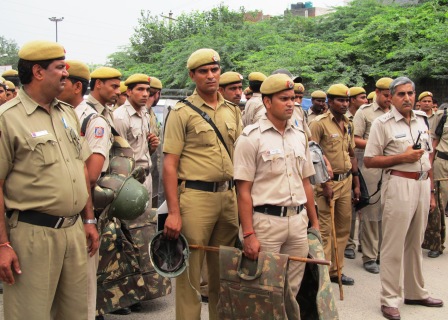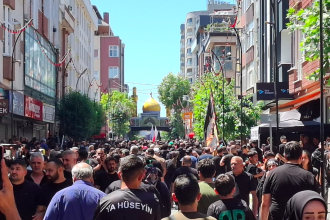The author argues why the community needs to come together and why the Delhi Police should accept the demand for a probe to clear all doubts and allegations…
Asad Ashraf for BeyondHeadlines
Today is the fourth anniversary of the dreaded killings of two youth in the Fourth Floor of the Building No L-18, Batla House in the vicinity of Jamia Millia Islamia on 19th September 2008. Terror surmounts our nerves and visuals full of horror are formed into the muscles of our brain uncoiling the dark memories of the bloody Friday.
According to the version of Delhi police claims on this which was repeated over and again through its different mouth pieces be it the electronic media, national dailies, press conference of the senior officials in the department stamped and sealed by the Home Ministry under Shivraj Patil, the then home minister boasting of cracking down a network of terror and unfolding the mysteries surrounding the blasts in the country. Special cell of the Delhi police received patting from every corner of the state machineries but at the same time there was another theory which was evolving which had put the tale of police in the domain of doubts, contradictions and criticism. The advocates of this theory had been keeping a close watch on the happenings since day one. These speculations, doubts were made public in the form protest taking place on the streets with the slogans demanding judicial enquiry into Batla House Encounter. Left wing student organizations demonstrated on the street fearless of the subsequent arrests made during the period, from this area.
Several forums, organizations including the prominent one like JTSA was formed with the motive of bringing out justice for the victims of this killings and challenge the array of accusations made by the Delhi police on the role of these peoples involvement in the blast that had taken place in different cities Independent enquiries and investigations were carried out in this complex case finally coming to a conclusion that there lies a lot of unread lines in the version of police theory which was needed to be exposed and hence subsequently a strong demand for a judicial enquiry in to the killings was made.
In reply to an R.T.I application filed by a student of Mass Communication at Jamia Millia, Mr. Afroz alam Sahil, the police refused to provide detailed information into the post-mortem reports of the killed suspects, by calling it as threat to the proceedings of the case. Although later it was brought into picture that the marks on their bodies suggested that before being killed they were beaten up badly. One of the dead had bullet penetrated in the central area of his head which clearly questions the claims of a gun battle, such injuries cannot take place in a face to face gun battle! The post mortem reports of the police inspector who was supposedly killed in the encounter raises similar such doubts.
Media created a stereotype about this area being a hub for terror breeding. They showed no hesitation in referring to those killed as terrorists when they were not even produced in the court or before any charge-sheet was filed. This ongoing drama was a big concern for that secular and progressive section of the society which works towards installing a democratic socio-political structure at a time when media is as a part of tradition seen as the fourth estate in a democracy, Mushirul Hasan the then vice chancellor of Jamia Millia Islamia slammed the media in his fullest intellectual capacity and marked those instances in his speech when Muslims of this country have Endorsed to secular lines than any other based on emotions. During an interaction with the students of the university, he tried to convince that they should come out of the psychological trauma and restart their normal life.
Four years have passed; the challenge in front of us is much bigger today as we face attacks on all fronts. Be it in the form of economic deprivation, social backwardness, and minority witch hunting by police or custodial deaths. That one incident on the grounds of which we started our fight has unfolded itself into several other dimensions. It’s no more just about the Batla House Encounter despite its significance in this movement. It’s about all those families who have lost their dear ones or have them behind the bars under trial for years waiting for justice. All this is happening in the extreme pressures building up from the Extreme Rightwing Hindutva forces and imperialist agents in the governments who have garnered all the reasons to use islamophobia as a tool for their economic and political gains. The central government has blatantly refused to install a judicial inquiry into the Batla house case there of rejecting all our demands for the same, but irony to this is that they don’t hesitate a bit in shedding out tears of crocodile right before the election campaigns where they have to put in place their sympathies for the community for electoral benefits.
One of the major argument on which the government has been playing its moves is that an enquiry into the matter will destabilize the morale of the police force. How ridiculous does it sound that for the sake of morale of a department, one of the biggest minority of the country is being tested with injustice met out to it all levels, and have to face a so far well established bias that “all terrorists are Muslims” in their daily lives. Wasn’t the report of justice Tamang in the Ishrat Jahan case enough for the government to take into consideration the accounts of the entire version in all such future courses? Or will it use everything that comes its way for its own unending desire to stay in power? How and why will a judicial enquiry demoralize the police force which is already accused of so many wrong doing and is facing so much of criticism in this case? If a judicial enquiry is put into place as per our demands for it we are very much hopeful that truth will come out in black and white, and if the police is so sure of its hand being free of any bad blood and collars unwrinkled should actually come forward and advocate for a judicial enquiry into the matter themselves so that the black ink which we have been throwing on them so far paints our shirts black in return.
The time has come for all of us to reorganize ourselves, put in place broader slogans with double the force and keep aside all our organizational and ideological differences to be resolved at a common minimum ground and through all other ventures continue to resist strongly in a democratic manner for a secular democratic India based on the [principles of inclusive growth and development. It’s high time when our state which is becoming more repressive with every passing day learn its lessons from history where popular movements have overthrown the most powerful states and their dictates, the most recent one is the case of Egypt, the tilt in our foreign policies towards the imperial and Zionist states paves to such form of repression should be checked immediately with more inward looking and self reliant inclusive policies.
(The author is student at Nelson Mandela Centre, Jamia Millia Islamia)










